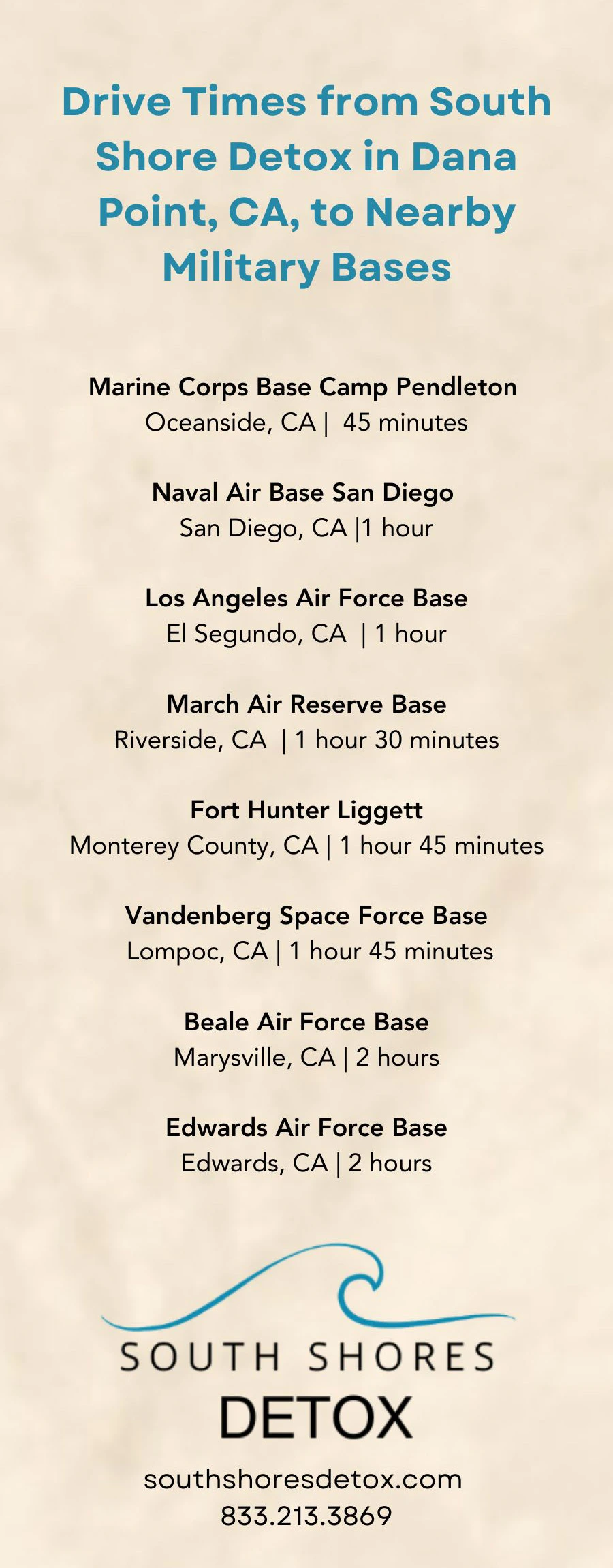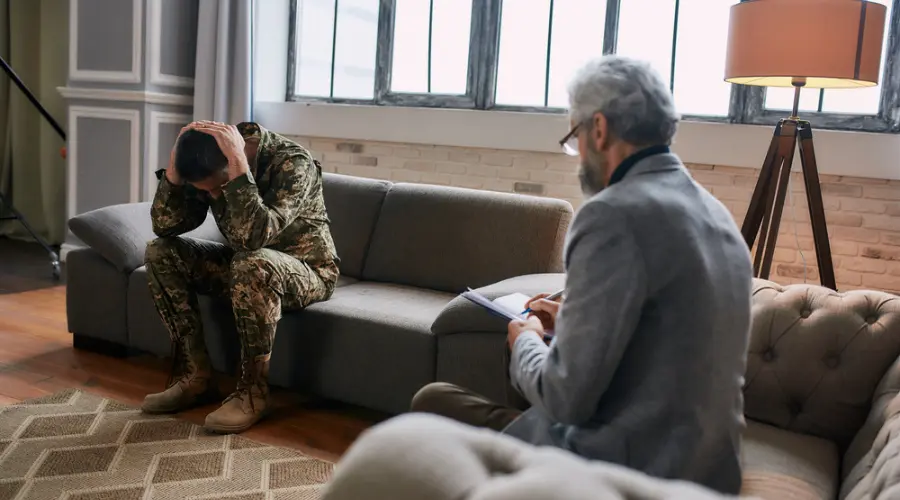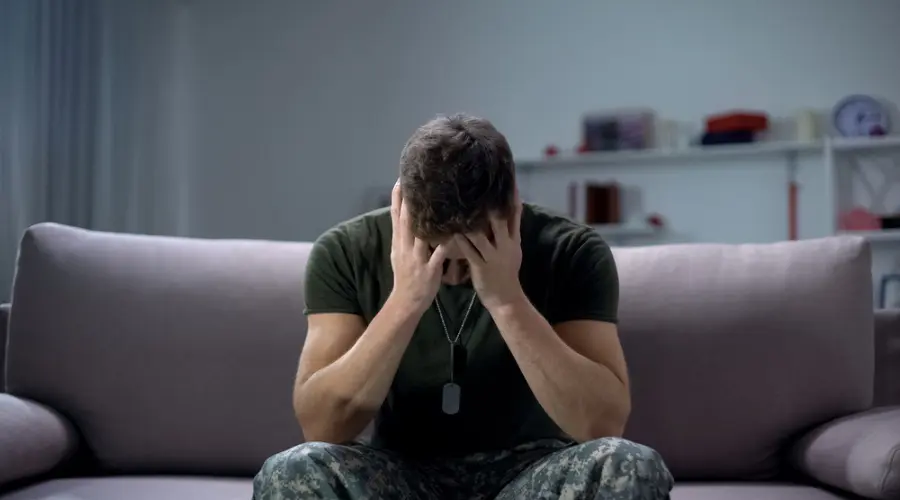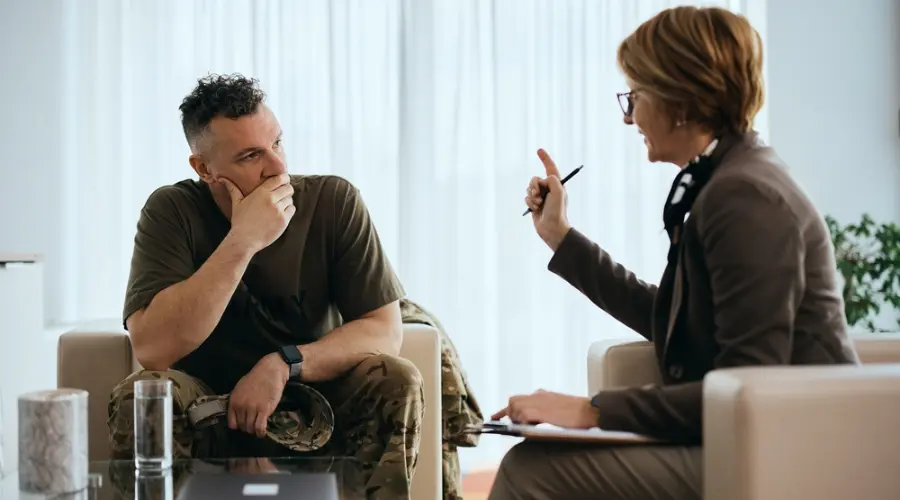Get Accredited Treatment Covered Using TRICARE or TriWest
Over 1.8 million United States Armed Forces veterans call California home. Another 158,754 active duty military personnel are based in the Golden State. With this large number of past and present military members, the demand for a tailored approach, including specialized programs and treatment options, is crystal clear.
Military life exposes people to unique challenges that most civilians can’t imagine. Veterans and active duty military members have unique mental health challenges that require effective but compassionate care.
South Shores Detox proudly offers military rehab center programs for both active-duty personnel and veterans, with a supportive environment and accommodating the proper forms of treatment. We are a Joint Commission-accredited substance abuse treatment center and accept both TRICARE and TriWest in-network. Our team will dig to the root of every client’s drug and alcohol addiction to discover and treat the underlying causes.
We invite you to read on and learn about the high-quality care we offer our brave men and women.
California’s Large Population of Military Members (Many Requiring Mental Health Treatment)

When most people think of military-friendly states, they think of the southeastern United States. Surprisingly to many, California actually has the largest number of active duty military personnel of any state (158,754, as mentioned earlier.) We also have the largest number of veterans in the nation, with veterans comprising 8.5% of the state’s population.
Of the veterans residing here, about:
- 9% of veterans have reported experiencing severe psychological distress in the past year.
- 9 out of 100,000 California veterans commit suicide annually. That number is below the national average, with veterans always at a higher risk than civilians, but still incredibly tragic.
These numbers highlight the need for treatment programs for the mental health issues our veterans face each day.
South Shores is within a 2-hour drive time from 8 active military bases, with Marine Corps Camp Pendleton and Naval Air Station North Island, Edwards Air Force Base, and Naval Air Base San Diego being the four most prominent bases. All are well within driving distance to attend residential treatment.
Key Causes of Mental Health Disorders in Military Life
Some might ponder why so many military members cope with substance abuse and addiction issues. Coping with transitions in the military is not easy for service members or their families. You might live off-base in Santa Ana today with your family and receive new orders that require a move to San Diego tomorrow. Military spouses often have employment challenges, and children cry when they have to leave friends behind.
Besides the uncertainty of location, many veterans we’ve treated in the past have explained these key causes of their various mental health conditions:
Witnessing or Experiencing Traumatic Events or Physical Injuries
Trauma is a primary reason many veterans seek comprehensive care for addiction and mental health challenges. Experiencing deployment often means witnessing traumatic events or physical injuries that lead to PTSD, anxiety disorders, and depression.
Deployments Cause Family and Relationship Issues
Deploying means long separations from loved ones and friends. It leads many to increased feelings of isolation or loneliness and stress. It adds to the burden of mental health disorders among military personnel.
The Stigma of Seeking Drug and Alcohol Rehab
Although military leadership constantly strives to reduce it, there’s an unfair stigma about seeking treatment in the military ranks. When someone needs addiction treatment or help with post-traumatic stress disorder, they sometimes fear others learning about their troubles.
Lack of Access to Care for Substance Abuse or Mental Health Disorders
Members who stay stateside can usually find addiction treatment centers. However, those who deploy often lack access to confidential, comprehensive addiction treatment or help for other mental health disorders. The long wait times for specialized care overseas can lead to a lack of treatment.
Furthermore, many deployed would prefer the confidentiality of a program that addresses substance abuse away from their base.
Lack of Life Skills Training When Returning to Civilian Life
Adjusting to everyday life after receiving a discharge presents a whole new set of challenges. With few life skills coaching opportunities, re-entry to civilian life is fraught with pitfalls. Years of a precise routine and training schedule make life on active duty somewhat predictable.
When the entire process is turned upside down upon discharge, some find themselves swept into alcohol or drug addiction.
Some Recovery Programs Don’t Accept Military Insurance Coverage
Some may realize that their mental health is in decline but can’t find help. As they research alcohol and drug addiction and mental health treatment programs, they learn that they can’t get the help they need. They accept that at face value and give up looking, allowing their self-care to lapse altogether as they give up.
Our Orange County treatment center accepts TRICARE and TriWest insurance – our admissions team will even call to coordinate your benefits. Call the admissions representative for details and to ensure you pay the lowest out-of-pocket cost for your inpatient or outpatient treatment.
A Military-friendly Treatment Center Is the Best Place to Resolve These Issues
Each of the above causes can lead to behavioral health issues, including substance use disorder, post-traumatic stress disorder, and other co-occurring disorders. The key to reversing this cycle is participating in evidence-based therapies.
Substance Abuse and Dual Diagnosis
Military personnel sometimes arrive at South Shores Detox for addiction treatment. They usually don’t realize the connection between alcohol and drug abuse and mental health disorders. Many of the people seeking a veterans program have an underlying cause, or dual diagnosis, that has led them to drug or alcohol abuse.
Some of the most common co-occurring disorders for which we provide support are the following:
- Adjustment disorders due to the stress and frequent transitions of the military lifestyle.
- Anxiety and panic disorders often result from trauma and constant pressure to perform flawlessly.
- Depressive disorders are sometimes caused by frequent absences from family and even from losing friends and colleagues.
- Post-traumatic stress disorder, which arises after exposure to a traumatic event or life-altering injury.
Co-occurring disorders are usually alcohol or drug addiction plus one of these additional issues.
Why Is Drug Rehab Necessary for Effective Co-occurring Disorder Treatment?
Addiction and mental health disorders often overlap and interweave, creating a web effect. The complexities are almost endless, with one condition worsening the other one. It makes a professional recovery program extremely important, as it’s almost impossible to untangle them without a comprehensive approach to mental health care.
A Holistic Approach for Long-Term Recovery
Attending our accredited addiction treatment offerings is only the first step in a recovery journey. At South Shores Detox, we take a holistic look at the individual and consider the many services that will help the person achieve long-term sobriety.
We are extremely proud of our ability to customize alcohol or drug rehab programs. Here are some of the main components we include for most people who come to us for substance use disorder treatment:
Personalized Approaches to Evidence-Based Therapy
Psychotherapy is the backbone of our therapeutic programs. Because no two people experience addiction exactly alike, we plan therapies according to each person’s diagnosis and needs. Some therapies we provide:
- Individual Therapy
- Group Therapy
- Family Therapy
- Cognitive Behavioral Therapy
- Dialectical Behavior Therapy
- Anger Management
- Life and Coping Skills Training
- Alternative Therapies (Yoga, art/music therapies, meditation)
We will tailor to each person’s situation. For instance, a person without any family members nearby may have individual and group therapy and forego family sessions. This approach allows us to be inclusive and provide the most effective treatment.
Finding the Right Level of Care
Everyone struggling with substance use doesn’t necessarily need around-the-clock residential care. Some will respond well to treatment in our intensive outpatient or partial hospitalization programs. We’ll work hard to address your unique challenges in the setting that will provide the most effective recovery program.
Medical Detox Minimizes Withdrawal Symptoms
Military men and women train to be tough as nails, sometimes even trying to go cold turkey to end substance use. In reality, it’s okay to ask for help. That’s particularly the case when it comes to ending an addiction to drugs or alcohol.
Your substance use has “rewired” your brain’s reward system. Where it used to send out pleasure signals in response to a warm hug or wiggling puppy, it now responds only to your drug of choice. When you cease the substance use abruptly, it sends out distress signals that cause withdrawal symptoms.
While some symptoms can be mild or flu-like, others, especially those that arise from ending use of alcohol or opioid drugs, can be lethal. Drug rehab specialists will prescribe medication to make withdrawal safer and far more comfortable.
An addiction treatment center is the safest place to detox, withdraw, and start your recovery journey.
Aftercare: Peer Support and Alumni Programs
Your addiction treatment doesn’t end when you walk out the doors on your last day of therapy. We have an active alumni program and invite you back for mentoring or to attend 12-step programs to support continual improvements to your mental health.
Samantha Is a South Shores Success Story
‘Samantha,’ a Navy wife, came to South Shores because she had developed an addiction to antidepressants and alcohol. The substance abuse started when her husband deployed to Afghanistan. While he was gone, she suffered the loss of her first baby. Alone, she had nobody to share her grief.
Her doctor had prescribed her anti-depressants to cope with the loss. She felt so alone. She moved to southern California with her husband just weeks before he received deployment orders. She’d left behind her job, friends, and family. She retreated to her home and continued to take pills and, eventually, started to drink. The behavior continued for the next several months.
The commanding officer’s wife, who often volunteered with military spouse causes, noticed Sam’s worsening appearance. When San confided about depression and substance abuse, the woman urged her to get help to avoid what seemed like mounting consequences.
The Need for Effective Dual Diagnosis Support
Sam admitted to the South Shores admissions representative that she had actually researched how many pills it would take to end her life. She understood that South Shores inpatient care would be the safest place to address the addiction to two substances and the chronic grief and depression. The admissions rep called the insurance company and explained the gravity of her suicidal thoughts; they approved Sam for an emergency admission.
After 30 days of intensive inpatient treatment, Sam moved to a nearby sobriety home and continued receiving outpatient care for an additional 30 days. Besides ending her desire to drink and take drugs, she worked with a therapist to process the grief over losing her baby. In her peer group, she developed strategies to build a support system when she returned to her housing unit in San Diego.
Sam’s husband returned from Afghanistan several months after her mental health crisis. They decided as a couple to go to the base chaplain for marital counseling to rebuild their relationship after losing their baby.
Today, they are stronger than ever and pray for a new baby. In the meantime, Sam has started a women-only AA meeting group for other military wives. She uses her experience to encourage other military spouses to be well.
Active Duty Members and Veterans Can Count on South Shores
The military lifestyle poses extreme challenges that most people cannot understand, making it common for veterans, active duty members, and families to seek refuge at our treatment center.
Because we are in-network with TRICARE and TriWest, we can provide the mental health and addiction treatment services you need to be well again.
You have given your nation your best; now it’s our honor to give you back our best. Call us today for more information about addiction treatment.




